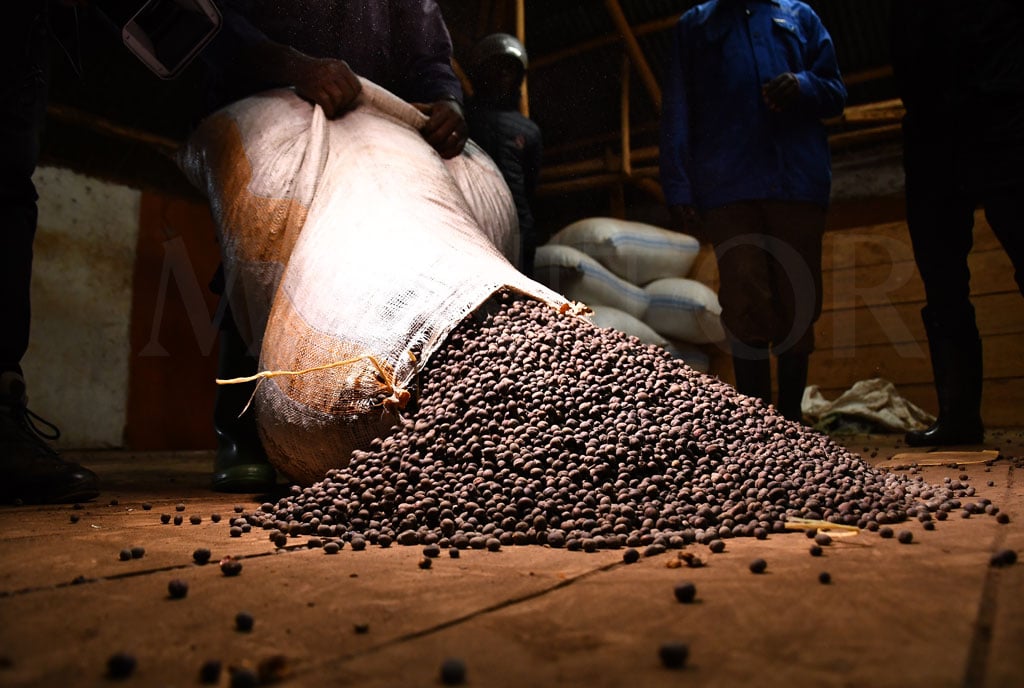
Opposition Members of Parliament during a plenary session at Parliament on October 24. PHOTO | DAVID LUBOWA
A section of legislators and experts yesterday said the dissolution of the Uganda Coffee Development Authority (UCDA) and the transfer of its functions to the Ministry of Agriculture, Animal Industry and Fisheries (Maaif) will have a negative impact on foreign earnings, exporters’ and farmers’ livelihoods.
Those opposed to the National Coffee (Amendment) Bill 2024 argue that Maaif is not capable of performing UCDA’s duties.
The Butambala County MP, Mr Muhammad Muwanga Kivumbi, told the Monitor that dissolving UCDA would result in reduced exportation of coffee due to a decline in quality, salary discrepancies, and difficulty in securing an international accreditation.
“Quality assurance and regulation in coffee does not necessarily start at the level of assessing the quality of coffee beans. It starts with the quality of seedlings. So, you look after the nursery bed, you guide the farmers on how to space and plant coffee, and then how to treat the weeds and pests. It goes all the way to ensuring that they have harvested the right coffee, they have dried it properly, they have roasted it properly, they have packed it properly, and they have stored it properly,” he said.
But according to the Agriculture Minister, Mr Frank Tumwebaze, if the Bill is enacted, a Coffee Production and Development Division will be created within the ministry to superintend the growth and marketing of the crop. The new department is expected to absorb UCDA employees, especially scientists.
Relatedly, the Kimanya-Kabonera MP, Mr Abed Bwanika, who co-authored the minority report opposing the dissolution, said disbanding UCDA would reverse the progress made .
He said UCDA has secured international certifications that allow Uganda’s coffee to meet stringent foreign standards, a process that could take Maaif five to 10 years to replicate.
“For quality issues, you must put up systems which involve personnel and approval. They involve those structures and these are internationally-recognised systems,” Mr Bwanika said.
Without these certifications, Uganda’s coffee exports would face restrictions, reducing income for farmers and exporters .
Mr Richard Ssempala, an economist and a lecturer at Makerere University School of Economics, said the coffee debate sends a negative signal to farmers and subsequently, if production reduces, Uganda will lose.
“Secondly, aggregate demand is highly impacted by household incomes, in case people's incomes reduce as a result of low coffee production, aggregate demand for other commodities will be affected. Even the demand for other commodities will consequently reduce. Therefore, the net effect of coffee is felt by all Ugandans,” he said.
Mr Brenda Nabukenya, the Luweero Woman MP, voiced additional concerns about Maaif’s ability to reach grassroots farmers.
“If UCDA is taken back to the ministry, we expect laxity because the ministry has a lot of work and you will have to terminate some of the contacts of the people working in UCDA. Unlike any other entity in Agriculture, we have seen UCDA come as low as in the villages to make sure we have the right quality coffee, harvest at the right time, among other,” Ms Nabukenya said.
She added: “The ministry can’t do all this work, they don’t have the capacity.”
Meanwhile, Maaif’s Permanent Secretary, Gen David Kasura Kyomukama, expressed confidence in the ministry’s ability to take over UCDA’s roles.
“We are forming what we call a food and agricultural chemicals authority, which is going to ensure that we certify and we are forming an authority to ensure that all that we send, beverages as food, have the highest quality,” he said.
MP Kivumbi questioned whether the ministry would have the capacity to manage coffee without proper transition, calling for a phased approach rather than an abrupt shift.
UCDA’s roles include certifying coffee quality and quantity, collecting and sharing industry data, monitoring global price shifts, conducting research, coordinating with Maaif on extension services, and promoting Ugandan coffee internationally.
According to Maj Gen Kasura, Maaif aims to take over these functions to lower administrative costs and increase profits across the coffee value chain, benefiting farmers and exporters.
THE BILL
Despite opposition, the National Coffee (Amendment) Bill 2024 was passed by Parliament, with a vote of 159 in favour and 77 against. The Bill now awaits President Museveni’s signature, which would formally transfer UCDA’s responsibilities to Maaif





